#i know some people specifically asked about results so i'll try and find your urls to tag in the notes
Text
TLT's Religion + Trauma Survey Results!
About a month ago, I shared a survey regarding the impact of TLT's religion on fans and specifically fans with self-identified religious trauma. This was part of a larger group project for a class, but a handful of people were interested in knowing the results, so here they are!
Before we start: this was a very informal project and necessarily limited. Response options were limited, it didn't inquire into demographic information, data was analyzed manually, and Christianity was the focus/frequently presumed given its global prevalence and relation to the story. Several avenues of analysis weren't pursued given time and project constraints, so please keep all this in mind
The survey was open for about a week and received 965 responses
First, respondents were asked on a scale of 1-4 "Does The Locked Tomb's use or depiction of religion impact your reading experience?" From the entire pool, 83.6% rated it as at least slightly impactful (further broken down in the graph), and 97.4% indicated this was a positive impact.
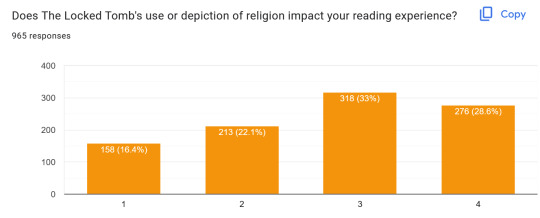
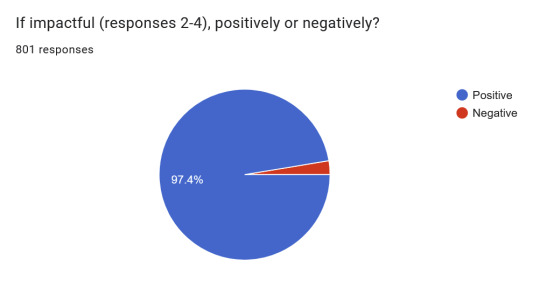
In open response, respondents listed some reasons why, ranging from: "“it's just a part of the story” to “I enjoy the examination of the ways religion can shape someone's world view, or be used to manipulate and control” and "Religion is my autistic special interest and I love fictional religions!"
Respondents were then asked "Do you have, in your opinion, religious trauma?" The qualifications of religious trauma were intentionally non-specified and left to respondents discretion.
358 respondents, 37.1%, marked yes
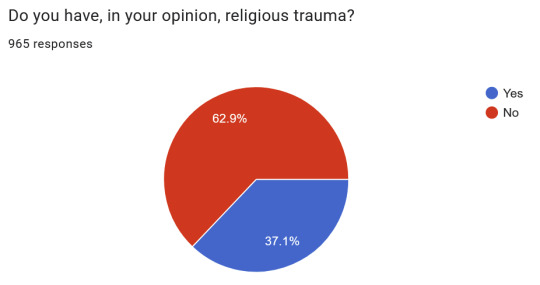
This specific group of 358 were asked if this religious trauma impacted their reading of TLT. 66.1% indicated that it did.
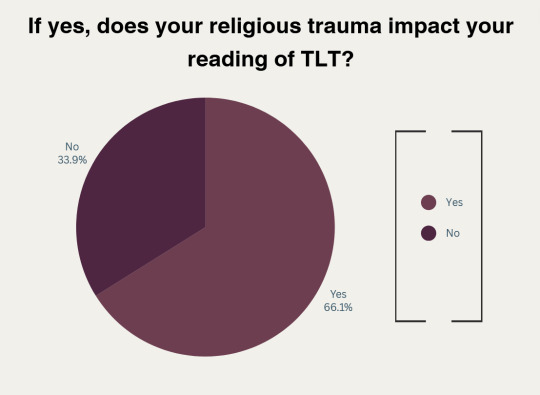
Open response answers elaborated on this, saying: “I think reading it is cathartic for me,” “Space trauma lets me look at my real trauma without me or real people being hurt in it,” and “making religion a part of the narrative and drawing out the themes in a way that can be analyzed and picked apart made my experience with religion something I could look at in a similar way.”
The first question from the survey was then returned to, and the ratings of the 1-4 scale were looked at solely in the group of 358 respondents with self-identified religious trauma.
Of these, 90.3% marked a 2 or higher (compared to 83.6); 15% marked a 2 (compared to 22.1%), 31% marked a 3 (compared to 33%), and 44.3% marked a 4 (compared to 28.6%). Pardon the quick graph, as I made it in about 3 minutes specifically for this
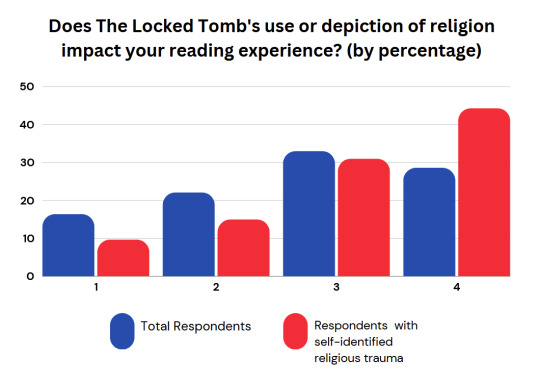
Respondents with religious trauma, on average, rated the series' depiction of religion as more impactful to their reading experience than respondents without.
All respondents were then asked, "Has TLT helped you challenge or reinforce your ideas of and experiences with religion?"
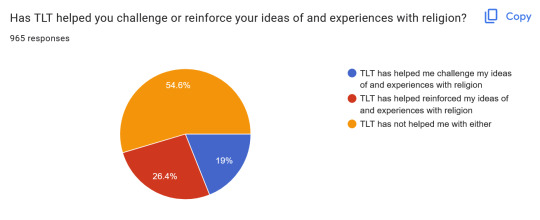
Respondents elaborated that: "it reinforced my ideas of religion because I see religion as a means of controlling people, often abusive, and rooted in the supernatural" or "It challenged me to consider how religion can be both a positive force and a hurtful institution. I knew this to a degree already, having experienced both, but reading about it helped reinforce that nuance."
Respondents were then asked on a scale of 1-5, "Does the original text or the fandom contribute more to challenging or reinforcing ideas of and experiences with religion?" 1 is individual text only, and 5 is fandom only.
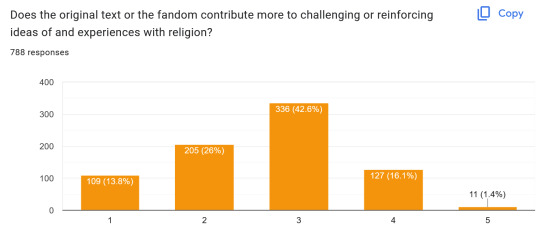
The majority of respondents indicated an equal impact from the original text and the fandom, however very few people were impacted only by the fandom (1.4%) compared to the number only impacted by the text (13.8%). This wasn't investigated further.
Finally, respondents were asked what religion they'd been referring to or thinking of when they'd been answering the above questions. The vast majority indicated Christianity or Catholicism, though we did not count exactly how many of each; it was clear it was the majority, and that sufficed for our purposes. A larger, more thorough study would be needed to look at Non-Christian/Catholic respondents' experiences in comparison.
The conclusion of all of this was that, as predicted, fans of TLT with self-identified religious trauma were more impacted by the series' use and depiction of religion. This was via catharsis, sympathy, identifying with the characters, and more.
The study demonstrates a function of speculative fiction that allows readers to engage with and process difficult topics (such as religious trauma) though a protected, distanced lens where no one real is hurt. This can be taken beyond TLT and to the genre as a whole, which is often dismissed as less literary or worthy of study than its classical counterparts, an opinion the surveyors argue against.
If you've made it to the end here, thank you again for all the responses and help! I hope you've enjoyed the results, and if there are any further questions feel free to ask and I'll do my best to answer them. Upfront, yes there were 2 other components to the project (looking at queer demographics for the fandom and analyzing common themes in fanart and fic); those were my groupmates' sections, so I haven't shared them, but if you're curious I can always ask them if they'd be open to sharing :)
#tlt#the locked tomb#gideon the ninth#harrow the ninth#gtn#long post#fandom study#i know some people specifically asked about results so i'll try and find your urls to tag in the notes#cannot thank y'all enough for the help with this. we were NOT expecting that many responses#which was why so many of the question options were limited#if we gave too many and had like. 40 people respond and 20 of those each chose a different answer#or gave an open response#that makes it so much harder to extrapolate anything useful from the data#anyway. i'll stop rambling but thanks again!#was one of my most fun projects this semester
23 notes
·
View notes